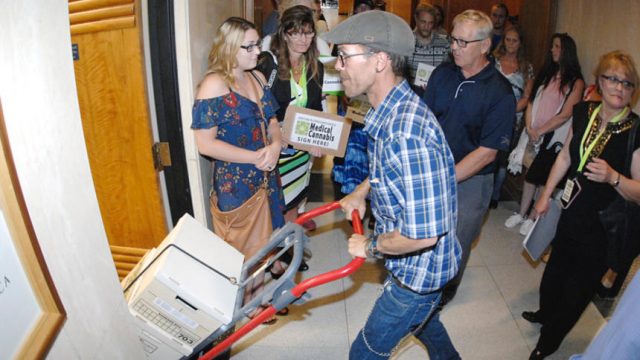Initiated Measures Need Checks and Balances Just Like Every Other Type of Policymaking

Brandon Muhs, front, of Fargo, North Dakota, pushes a dolly cart with boxes containing petition signatures into the Secretary of State's office on 7-11-2016 for a medical marijuana initiative for consideration on the November ballot. Initiative committee chairman Rilie Ray Morgan, second from right, and his wife, Rita, far right, also of Fargo, were among a group of supporters gathering at the state Capitol in Bismarck, North Dakota.
Any American who has attended a civics class is familiar with the term “checks and balances.” It’s a term used to describe the effort to achieve moderate and dependable laws through the separation of government power.
Lawmakers write the laws, but the executive branch can veto them. Lawmakers can override vetoes, but the judicial branch can review and reject laws they find unconstitutional.
You get the point.
But the initiated measure process, which in North Dakota means that any group of activists can gather signatures (or pay someone to gather them) and legislative directly at the ballot box, mostly lacks those procedural hurdles.
A simple vote on a measure can make statutory law and even amend the state constitution with little in the way of checks or balances.
[mks_pullquote align=”right” width=”300″ size=”24″ bg_color=”#ffffff” txt_color=”#000000″]Politicians and activists like to work themselves up into a high moral dudgeon over the idea that direct democracy is anything other than the sacred will of the people which must absolutely be obeyed.[/mks_pullquote]
That’s a problem a commission just authorized through legislation passed in Bismarck yesterday should address.
The commission is tasked with studying ways to improve the initiated measure process, which is a fraught topic. Politicians and activists like to work themselves up into a high moral dudgeon over the idea that direct democracy is anything other than the sacred will of the people which must absolutely be obeyed.
“Senate Minority Leader Joan Heckaman, D-New Rockford, warned lawmakers to be careful before altering the measure process, which she said is the only direct way for citizens to enact policy without going through the Legislature,” my colleague John Hageman reports.
But Heckaman is supposing that citizens should have a way to directly enact policy.
Lawmakers themselves don’t have that authority. Any given legislator’s bill must pass not only the chamber he (or she) is elected to, but pass muster in a second legislative chamber and pass the executive branch’s veto scrutiny as well.
That is far more review than initiated measures get, and policy emerging from that process is the better for it.
It’s not fashionable, but I believe that most of the people elected to the Legislature in Bismarck do a good job of representing their various constituencies. The mistake most dissenters to this opinion make is assuming that the proclamations from activists and gadflies, which often earn an undue amount of attention from the press, are representative of majority positions.
They’re usually not. If they were, we would see far more turnover in Legislative races than we do.
All that said, I do like the idea of giving the people some ability to legislate.
I like referendums, for instance, whereby citizens can collect signatures and put a law passed through the legislative process on the ballot for a potential veto vote. So why not treat initiated measures the same way? Why not limit the policy proposals which can be placed on the ballot to those that were first considered in the Legislature?
If voters can veto a bill the Legislature passes, why not let them enact a bill the Legislature defeated?
That way citizens can still be directly involved in the legislating process without leaving our laws, and our state constitution, open to changes through the whims of a given election cycle.




